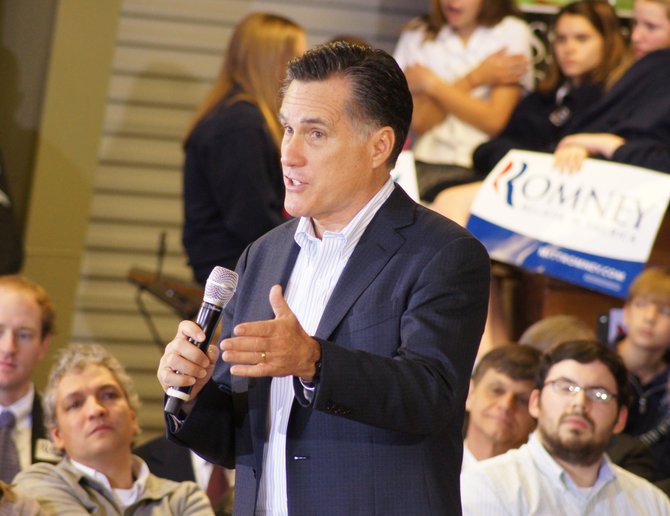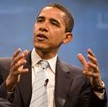Mitt Romney is running for president on a platform of returning many costs to the states. Photo by R.L. Nave
DENVER (AP) — President Barack Obama and Republican Mitt Romney come face to face for the first time in this presidential campaign Wednesday night for a nationally televised debate that will give millions of Americans a chance to size up two fierce competitors in a moment of high-risk theater.
Romney, trailing in polls in a number of key states and running short on time to reverse his fortunes, is angling for a breakout performance in the three 90-minute presidential debates scheduled over the next three weeks.
Obama, well aware that the remaining five weeks of the race still offer enough time for tectonic shifts in his prospects, is determined to avoid any campaign-altering mistakes as he presses his case for a second term.
A pre-debate skirmish Tuesday over Vice President Joe Biden's passing reference to "a middle class that has been buried the last four years" demonstrated how just a few words can mushroom into something larger during a heated contest for the White House.
Wednesday's 9 p.m. EDT faceoff between Obama and Romney on domestic policy at the University of Denver is sure to offer a blend of choreography and spontaneity: Both men have spent hours rehearsing smart lines and pithy comebacks with proxy opponents — yet know to expect the unexpected.
"That's what so tricky about this," says Alan Schroeder, author of a book on presidential debates. "There's never a template for preparing because each one takes its own direction."
The central role of the economy in this election is evident in the topics selected for the first three of the night's six debate segments: The Economy I, The Economy II and The Economy III. The last three segments will focus on health care, the role of government and governing.
Romney has pinned his campaign on the argument that Obama has failed to adequately juice up the U.S. economy, but his challenge is reflected in recent polls showing growing public optimism about the economy and the president's leadership. His case got tougher after a secret video revealed Romney telling donors that it's not his job to care about the 47 percent of Americans who don't pay federal income taxes and believe they are victims.
Romney tried to address accusations that he doesn't care about those voters with a new ad Wednesday in which the casually dressed candidate looks at the camera and acknowledges the struggles of Americans living paycheck to paycheck. "We should measure our compassion by how many of our fellow Americans are able to get good-paying jobs, not how many are on welfare. My economic plan will get America back to work and strengthen the middle class," he says.
Republicans tried to frame the economic debate in their terms Tuesday by pointing to the vice president's comments in North Carolina about the beleaguered middle class as an unwitting acknowledgment that Obama's economic policies have devastated average Americans.
"We agree," GOP vice presidential nominee Paul Ryan declared in Iowa. "That means we need to stop digging by electing Mitt Romney the next president of the United States."
Obama's camp countered that it was the policies of the president's Republican predecessors that had caused the damage.
Biden, at a later campaign event, was careful to say that "the middle class was buried by the policies that Romney and Ryan supported," calling their economic plans an amped-up rework of those from the George W. Bush years.
Romney calls Wednesday's debate the beginning of a monthlong "conversation with the American people," and the debates do tend to consume much of the political oxygen for several crucial weeks.
The candidates will be speaking to a TV audience of tens of millions in one of those rare moments when a critical mass of Americans collectively fix their attention on one event. Fifty-two million people tuned in to the first debate four years ago, and 80 percent of the nation's adults reported watching at least a bit of the debates between Obama and Republican John McCain in 2008.
The two campaigns on Wednesday announced new websites — http://debates.mittromney.com and http://barackobama.com/debate — to respond to their opponent in real time.
In a quadrennial pre-debate ritual, each campaign has worked overtime to raise expectations for the opponent while lowering the bar for its own candidate. The thinking is that it's better to exceed lukewarm expectations than to fail to perform at an anticipated level of great skill.
But both men are seasoned debaters: Obama has been here before, facing off with McCain in 2008. Romney hasn't gone one on one in a presidential debate, but he got plenty of practice thinking on his feet during 19 multicandidate debates held during the Republican primaries.
On a long day of debate prep — Romney in Denver and Obama in Henderson, Nev., near Las Vegas — both candidates tried to blow off some steam Tuesday. The president made a tourist's visit to nearby Hoover Dam, and Romney fit in a lunchtime outing to a Mexican grill for a burrito bowl.
The two candidates' biggest fans talked up their debating abilities in pre-debate interviews.
Michelle Obama told CNN she's like a nervous parent watching a child performing on the balance beam when her husband debates.
"I do tell him to have fun and relax and just be himself, because the truth is, if he's the Barack Obama the country has come to know and trust, he is going to do a great job," she said.
Ann Romney said her husband always looks around to find her in the debate audience and keeps a paper in front of him that says "Dad" — to remind him to make his father proud.
As for her advice, Mrs. Romney told KMGH-TV in Denver that she tells her husband: "Sweetie, you had five boys. You learned to argue really well and make your points years ago. Just go do that."
Wednesday's format: The moderator, PBS newsman Jim Lehrer, will open each 15-minute segment with a question, and Obama and Romney each will have two minutes to answer. After that, it's up to Lehrer to keep the conversation going and to intervene if one candidate goes on too long.
Obama and Romney have a two-track mission with debate viewers: Motivate core supporters to turn out and vote — at a time when early voting already is under way in many states — and try to lock in some new supporters from among the small subset of viewers who haven't settled on a candidate or whose support for one man or the other is squishy.
The viewers who matter most live in the contested battleground states that will determine which candidate gets to 270 electoral votes on Nov. 6: Colorado, Florida, Iowa, Nevada, New Hampshire, North Carolina, Ohio, Virginia and, to a lesser extent, Wisconsin.
Recent national polls show the two candidates in a tight race among likely voters. But Obama has the advantage in many of the battlegrounds, including Colorado.
Romney and Obama debate again Oct. 16 in Hempstead, N.Y., and Oct. 22 in Boca Raton, Fla. Biden and Ryan have their lone debate on Oct. 11 in Danville, Ky.
Obama plans to use the first presidential debate as the hook for fundraisers and recruiting volunteers. Former President Bill Clinton will be in Boston on Wednesday night for Obama, with donors paying $20,000 a person. New York Gov. Andrew Cuomo is headlining a New York fundraiser.
The Obama campaign plans more than 4,000 debate-watching events around the country. And Biden is scheduled to hold a live discussion with supporters that will be streamed online after the debate.
The Romney camp planned 336 debate parties at restaurants, bars, grills, VFW halls and other sites concentrated in battleground states.
Copyright Associated Press. All rights reserved. This material may not be published, broadcast, rewritten, or redistributed.




Comments
Use the comment form below to begin a discussion about this content.
comments powered by Disqus